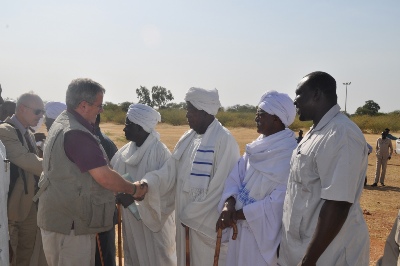Sudanese tribal leaders visit US to support normalization of ties
June 5, 2015 (KHARTOUM) – A delegation from Sudan’s native administration left for the United States on Friday to urge the US administration to lift the economic sanctions imposed on the country.

Al-Sheikh, who spoke at a press conference on Thursday evening, said the delegation would focus on popular meetings to improve ties between the two peoples.
He pointed out that US senators will visit Sudan to assess the situation in the country particularly regarding claims of extremism and terrorism.
The Sudanese businessmen are the first to be affected by the sanctions which impose an embargo on the Sudanese banking establishments prevent them from dealing with the international banks.
The initiative targets civil society groups and congressmen with the hope that they can understand their point of view that the sanctions mainly affect only Sudanese people not the government.
Benjamin Moeling, deputy chief of mission at the US embassy in Khartoum, for his part, expressed his country’s readiness to accept any initiative aiming to promote public diplomacy between the two countries.
He pointed that the American people welcome the visit of the tribal chiefs, saying they had earlier invited several Sudanese youth, media workers and businessmen to visit the US within the framework of the public diplomacy.
Sudan is on the US list of countries supporting terrorism since 1993 and also subjected to economic sanctions since 1997.
Last February, the Sudanese presidential assistant Ibrahim Ghandour concluded a rare visit to Washington where he held talks with senior officials at the White House and State Department.
The Sudanese foreign minister Ali Karti also visited Washington separately in February to participate in the National Prayer Breakfast together with US president Barack Obama and international dignitaries.
Following the visits of the senior Sudanese officials to Washington, the US Deputy Assistant Secretary in the Bureau of Democracy, Human Rights and Labour Steven Feldstein paid a five-day visit to Sudan.
During the same month, the US Department of Treasury’s Office of Foreign Assets Control (OFAC) announced that is amending Sudan’s sanctions regime to allow exports of personal communications hardware and software including smart phones and laptops.
Washington acknowledges Sudan’s cooperation in the fight against terrorism, but attached new conditions to normalizing ties related to the end of the conflicts in Darfur, Blue Nile and South Kordofan.
Sudanese officials however, insist that issues of bilateral relations should be discussed without interfering in Sudan internal affairs.
(ST)
